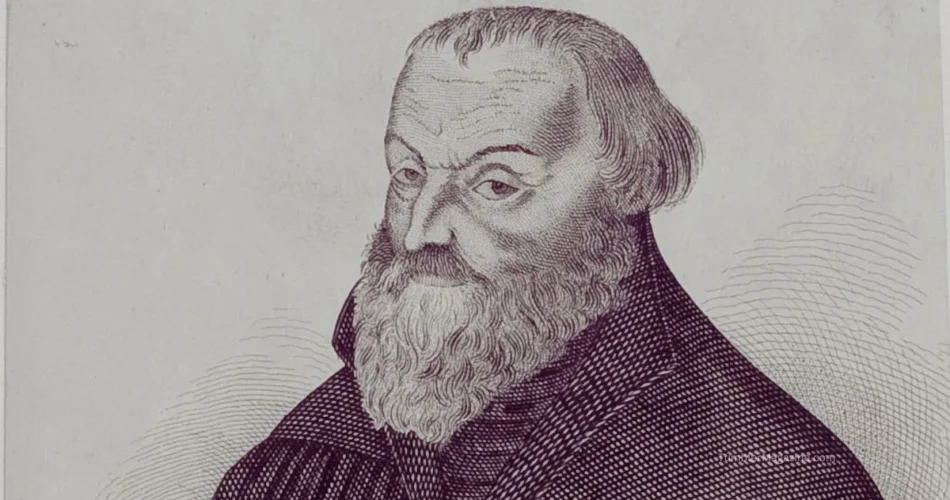Primož Trubar, a key figure in Slovenian history, was born in 1508. He embarked on a path that would shape the future of literature and religion in his homeland. It’s early years were marked by a thirst for knowledge, leading him to study theology and languages. His passion for writing and education propelled him to publish the first books in Slovene.
It’s most notable work is “Katekizem,” a religious text that played a crucial role in shaping the Protestant Reformation across Slovenia. Through his writings, he sought to promote literacy among the common people and spread Protestant ideas. Despite facing opposition from established authorities, Trubar persisted in his mission to make knowledge accessible to all.
His legacy endures today through commemorations and celebrations of his contributions to Slovenian culture. Join us as we uncover the lasting impact of it’s life and works on literature and religion alike.
Table of Contents
Introduction
Welcome to a fascinating journey delving into the life and works of Primož Trubar, a pivotal figure in Slovenian history. His contributions have left an indelible mark on literature and religion, shaping the cultural landscape for generations to come.
Primož Trubar’s legacy extends far beyond his time, influencing not only Slovenia but also broader European intellectual movements. By understanding his background and motivations, we can appreciate the depth of his impact on society.
It’s story is one of resilience and determination in pursuit of knowledge and enlightenment. Through exploring his early life and education, we gain insight into the formative experiences that shaped his worldview.
Join us as we unravel the captivating narrative of Primož Trubar, shedding light on a lesser-known yet immensely significant historical figure whose influence continues to resonate today.
Primož Trubar: A Brief Overview
Primož Trubar, a significant figure in Slovenian history, is often hailed as the father of the Slovene literary language. Born in 1508 in what was then the Habsburg Monarchy, Trubar dedicated his life to promoting literacy and education among the Slovene people.
His contributions extended beyond literature; he played a crucial role in shaping Protestantism within Slovenia during the Reformation. Through his writings and translations of religious texts into Slovene, he helped establish a sense of national identity among his fellow countrymen.
It’s efforts were not without challenges; facing opposition from political and religious authorities, he persevered to ensure that Slovenes had access to written works in their own language. His determination laid the foundation for future generations of writers and thinkers in Slovenia.
Today, Primož Trubar’s legacy continues to be celebrated through various cultural events and institutions dedicated to preserving his memory.
Early Life and Education
Primož Trubar was born in 1508 in the village of Rašica, which was part of the Habsburg Monarchy. Growing up in a time of religious and political upheaval, he witnessed firsthand the tensions between Catholicism and Protestantism.
It’s thirst for knowledge led him to pursue education at various institutions across Europe. He studied in Austria, Italy, and Germany, immersing himself in humanist ideas that would later influence his literary works.
During his travels, Trubar encountered Protestant reformers like Martin Luther and Ulrich Zwingli. Their teachings resonated with him, shaping his beliefs and inspiring him to contribute to the Reformation movement through writing.
Despite facing opposition from authorities loyal to the Catholic Church, Trubar continued to advocate for religious reform and cultural revival among Slovene-speaking people. His dedication to promoting literacy and translating religious texts into Slovene laid the foundation for modern Slovenian literature.
Contributions to Literature and Religion
Primož Trubar made significant contributions to both literature and religion during the 16th century. As a Protestant reformer, he played a crucial role in shaping Slovenian identity through his written works. Trubar is best known for being the author of the first books in the Slovene language, such as “Katekizem” and “Abecednik.”
His literary efforts were not only aimed at spreading religious teachings but also at promoting literacy among the common people. By translating religious texts into Slovene, Trubar helped make them more accessible to the local population. This initiative laid the foundation for Slovenian literature and contributed to the development of a distinct national culture.
In addition to his literary endeavors, it’s influence on religion was profound. He challenged prevailing Catholic doctrines and advocated for reforms that aligned with Protestant beliefs. Through his writings and teachings, he sparked a religious awakening among Slovenes and fostered a sense of spiritual independence.
Primož Trubar’s contributions to literature and religion left an indelible mark on Slovenian society, paving the way for cultural growth and intellectual enlightenment.
Impact and Legacy
Primož Trubar’s impact and legacy extend far beyond his lifetime, shaping the cultural and religious landscape of Slovenia. As the author of the first books in Slovene language, he played a pivotal role in promoting literacy among the common people and fostering national identity.
His translation of religious texts enabled widespread access to spiritual teachings, sparking a reformation movement that greatly influenced Protestantism in Central Europe. It’s emphasis on education laid the groundwork for future generations to embrace learning and knowledge.
Even today, his works continue to inspire scholars, writers, and theologians worldwide. The enduring legacy of Primož Trubar serves as a testament to his vision for the empowerment of individuals through language and literature.
Commemoration and Recognition
Primož Trubar’s contributions to literature and religion have not gone unnoticed. His impact on Slovenian culture is profound, leading to various forms of recognition and commemoration. In his hometown of Rašica, a memorial park dedicated to him stands as a tribute to his legacy.
Furthermore, numerous statues and monuments across Slovenia honor his work and influence. It’s face can also be found on the Slovenian 2 euro coin, symbolizing his importance in the country’s history.
Each year, events and exhibitions are held in remembrance of Primož Trubar, celebrating his achievements in literature and religious reform. His name continues to be revered in academic circles worldwide for paving the way for Slovenian language development.
The significance of Primož Trubar’s life continues to be acknowledged through various forms of recognition, ensuring that future generations remember his vital role in shaping Slovenian identity.
Bibliography
For those interested in delving deeper into the life and works of Primož Trubar, exploring a bibliography of scholarly sources is essential. These resources provide valuable insights into his contributions to literature and religion during the 16th century Reformation period.
In examining various books, articles, and academic papers dedicated to it’s legacy, readers can gain a comprehensive understanding of his impact on Slovenian culture and language. Biographies, historical analyses, and religious studies offer different perspectives on his significance in shaping Protestantism in Slovenia.
Furthermore, primary sources such as it’s own writings like “Katekizem” (Catechism) are crucial for studying his theological beliefs and literary style. Additionally, modern interpretations by contemporary scholars shed light on the enduring relevance of it’s ideas in today’s society.
By consulting a diverse range of bibliographic materials, enthusiasts can deepen their appreciation for Primož Trubar’s enduring influence on Slovenian history and literature.
Further Reading and Resources
For those who want to delve deeper into the life and works of Primož Trubar, there are several resources available for further exploration. Scholars and enthusiasts can refer to academic publications such as “The Life and Works of Primož Trubar” by Janez Vrečko or “Trubar: Father of the Slovenian Literary Language” by Anton Slodnjak.
Additionally, visiting museums dedicated to Trubar in Slovenia, such as the Primož Trubar House of Literature in Ljubljana, offers a tangible connection to his legacy. Online archives and exhibitions also provide a wealth of information on this influential figure in Slovenian history.
By delving into these resources, readers can gain a comprehensive understanding of Primož Trubar’s significant contributions to literature and religion, leaving a lasting impact on Slovenian culture that continues to be celebrated today.

